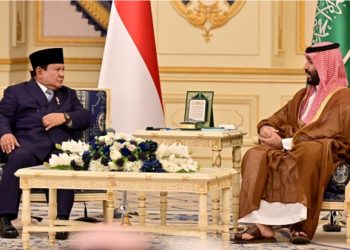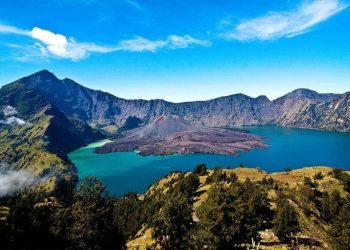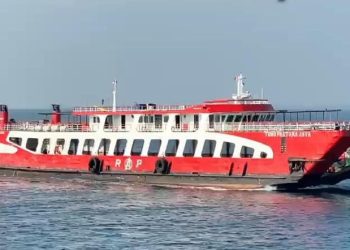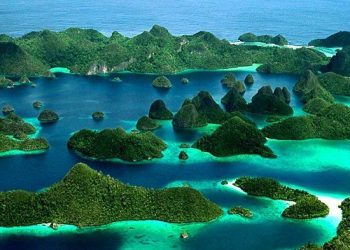Jakarta, Indonesian Sentinel – Ports play a very important role for Indonesia, connecting one island to another. There are around 3,227 ports that ensure connectivity and improve the economy in a sustainable manner where 40% of international trade routes pass through Indonesian waters. Coordinating Minister for Maritime Affairs and Investment, Luhut B. Pandjaitan said that the development of connectivity and digitalization of ports in Indonesia is currently on the right track.
“Everything we do now leads to digitalization. Digitalization is building a system so that we cannot create things that we do not want because a dignified and advanced country builds a system. The government wants to make efficiency by building Smart Port and Green Port. All of our state activities must be carried out with digitalization, thus we become more efficient, increase state revenue, and avoid or reduce corruption here and there,” said Luhut in his remarks at the Green Port 2022 Awarding event online on Wednesday, December 28, 2022.
Although the Green Port assessment was halted due to the Covid-19 pandemic and weakened almost all development activities, Luhut remains confident that the progress of Indonesian ports towards international standards will continue. He highly appreciated the construction of 14 ports that have been digitally integrated, thus minimizing corrupt practices at the port due to the digitalization system.
“Currently there are 112 ports under Pelindo and 37 under various other institutions, all of which we must build not only Green but also Smart Port and can be completed within the next 2 years. Next year I hope we can complete 149 ports so that they are digitized. If this year 14 ports are finished, we just need to replicate it to other ports. This is how we build an ecosystem,” Luhut added.
In line with Luhut, Minister of Transportation Budi Karya Sumadi, who was present online, said that the directive from the President was that ports must be efficient and competitive while also considering environmental sustainability.
“Ports not only have economic functions but also environmental functions. We have developed many ports and delivered this environmental issue for good functions. The commitment to make Green Port is a must and is prepared together, not ego-sectoral and needs the commitment of all stakeholders. In addition, port activities must have a negative impact on the environment, so neutralizers are needed such as procuring tools to help the environment absorb emissions,” explained Minister of Transportation Budi.
Green and smart ports play a role in realizing the commitment to infrastructure development and maritime connectivity by building sea tolls, seaports, logistics, and shipping industries, as well as marine tourism. In implementing the Green Port Program, the Government of Indonesia focuses on 4 main aspects, namely waste management, climate change control such as supporting mangrove rehabilitation, renewable energy management, and digitalization of port services. Kemenko Marves in collaboration with IDSurvey carried out the Green Port 2022 Assessment with the theme “Indonesia Towards World Class Sustainable Ports”. The assessment team, which consists of members from Sucofindo and the Indonesian Classification Bureau, is accompanied by representatives from Kemenko Marves, KLHK, Ministry of Transportation, Ministry of BUMN, and Ministry of Energy and Mineral Resources in the Advisory Board and Technical Team of the Green Port Assessment Working Group (Pokja).
The Director of the Green Port Assessment Working Group as well as the Deputy for Coordination of Environmental Management and Forestry of the Kemenko Marves, Nani Hendiarti, said that the green port assessment and awarding program was initiated by the Kemenko Marves since 2019, but had a vacuum in 2020-2021 due to the co-19 pandemic and was finally implemented again in 2022. This event aims to prepare Indonesian ports that are international and sustainable. There are several improvements from the implementation of the 2022 Green Port Assessment, namely the online dashboard used for a faster and more accountable Green Port self-assessment process. Furthermore, a hybrid verification process is carried out through an assessment to the ports by a team of assessors.
“The Green and Smart Port criteria applied by the Working Group Team have referred to international guidelines, namely the Green Port Award System (GPAS) from the APEC Port Services Network (APSN), in addition to international and national standards in the fields of environment and transportation. We report that the Green Port 2022 assessment program has been completed and participated by 10 ports in Indonesia, namely 7 Pelindo ports and 3 special ports,” said Deputy Nani.
Of the 10 ports, 6 ports have scored above 75% based on criteria focused on management: waste, energy, and climate change control. The following is a list of 10 ports that received the award:
- Terminal for Own Use (TUKS) Petrokimia Gresik
- PT Krakatau Bandar Samudera – Krakatau Bandar Samudera Public Terminal
- Special Terminal of PT Pupuk Kalimantan Timur
- PT Pelabuhan Indonesia (Persero) Regional 3 Sub Regional Bali Nusra Benoa Port
- PT Pelindo Terminal Petikemas – Semarang Container Terminal
- PT Terminal Teluk Lamong (TTL)
- PT IPC Terminal Petikemas – Tanjung Priok
- PT Pelabuhan Indonesia (Persero) Regional 3 – Tenau Kupang Port
- PT Pelabuhan Indonesia (Persero) Regional 2 Banten – Ciwandan Port
- PT Pelabuhan Indonesia (Persero) Regional 2 Pontianak Kijing Terminal
“Going forward for 2023, we will not only assess Green Port, but Green and Smart Port. Starting next year, we will involve private ports and build this nation, we need the role of SOEs and the private sector as well. We can also combine it with the national logistic ecosystem,” said Ministerial Advisor for Defense and Security Affairs of the Coordinating Ministry as well as the Green Port Assessment Advisory Board, Prof. Marsetio.
Closing his remarks, Luhut hoped that the implementation of the Green Port assessment and awarding in 2022 can spur all stakeholders to work together more intensely in realizing ports in Indonesia towards World Class Sustainable Ports.
“The implementation of green and smart ports is expected to increase added value for ports in Indonesia. It is still necessary to update regulations and roadmaps to accelerate the achievement of the target of 10 International Ports in Indonesia to meet all Green and Smart Port criteria by 2030, as well as to implement green shipping in line with technological developments,” Luhut concluded.

























